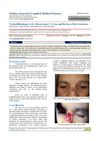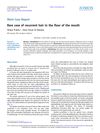 3 citations,
February 2020 in “The journal of gene medicine”
3 citations,
February 2020 in “The journal of gene medicine” A mutation in the HR gene causes a rare form of irreversible hair loss in two Kashmiri families. Whole exome sequencing is effective for finding such mutations.
[object Object]  2 citations,
November 2018 in “Destaques Acadêmicos”
2 citations,
November 2018 in “Destaques Acadêmicos” Microneedling showed the most significant results for treating hair thinning in Androgenetic Alopecia.
 1 citations,
October 2013 in “A & A case reports”
1 citations,
October 2013 in “A & A case reports” Hair loss from telogen effluvium may not happen again after another surgery.
 1 citations,
November 2017 in “Skin appendage disorders”
1 citations,
November 2017 in “Skin appendage disorders” Ingrown hairs are a common feature in scarring alopecias due to follicular damage.
 June 2021 in “Scholars journal of applied medical sciences”
June 2021 in “Scholars journal of applied medical sciences” Trichofolliculoma, a rare benign hair follicle tumor, can potentially recur.
 April 2024 in “DAHUDER Medical journal”
April 2024 in “DAHUDER Medical journal” Ocrelizumab may cause pancreatitis in some patients.
 November 2023 in “Circulation”
November 2023 in “Circulation” Minoxidil can cause a rare but serious condition that leads to fluid buildup around the heart and drug-induced lupus.
 January 2020 in “Journal of oral medicine and oral surgery”
January 2020 in “Journal of oral medicine and oral surgery” Hair grew in a man's mouth due to a rare condition called heterotopia.
January 2018 in “Urologe A” Botulinum neurotoxin injections into the pelvic muscles successfully prevented priapism relapse for over six months.
[object Object] February 2016 in “Journal of Allergy and Clinical Immunology” Consider DRIF and perform skin biopsies for persistent papular rashes.
The combination of high-dose toremifene and capecitabine was effective for advanced recurrent breast cancer.
 65 citations,
February 2015 in “Neuro-Oncology”
65 citations,
February 2015 in “Neuro-Oncology” Alisertib was found to be an effective and tolerable treatment for children with recurrent brain tumors.
 12 citations,
April 2005 in “Mycoses”
12 citations,
April 2005 in “Mycoses” A 1-day or 3-day itraconazole treatment is effective for acute vulvovaginal candidosis, but recurrent cases may need longer treatment.
6 citations,
June 2014 in “PubMed”  6 citations,
July 2013 in “Archives of Plastic Surgery”
6 citations,
July 2013 in “Archives of Plastic Surgery” Using thigh skin, doctors successfully rebuilt a woman's scalp after removing a large tumor, with no tumor return after 8 months.
5 citations,
January 2014 in “Indian Journal of Nephrology” A woman with lupus had muscle weakness due to kidney issues and was successfully treated with medication.
 3 citations,
September 2019 in “American Journal of Men's Health”
3 citations,
September 2019 in “American Journal of Men's Health” Finasteride may not affect gynecomastia recurrence after mastectomy.
1 citations,
October 2018 in “The American journal of gastroenterology” Relapsing hepatitis A can cause prolonged abnormal liver tests even without symptoms.
1 citations,
April 2018 in “Infectious diseases in clinical practice” Travel history and tick-borne diseases should be considered in unexplained fevers for timely diagnosis and treatment.
 September 2024 in “Pediatrics in Review”
September 2024 in “Pediatrics in Review” A trichobezoar caused the girl's recurrent intussusception, and surgery plus psychiatric therapy resolved her symptoms.
 January 2024 in “Dermatology practical & conceptual”
January 2024 in “Dermatology practical & conceptual” Male gender and family history predict alopecia areata recurrence.
 April 2023 in “Cancer research”
April 2023 in “Cancer research” KRTAP2-3 could help predict cancer recurrence by identifying specific cancer cells.
 December 2022 in “BMC women's health”
December 2022 in “BMC women's health” The CNC® prosthetic system improved body image in breast cancer patients with hair loss from chemotherapy but did not significantly change their psychological wellbeing.
January 2022 in “Clinical Cases in Dermatology” A man has a common skin condition called seborrheic dermatitis, treated with special shampoos and sometimes medication.
 April 2019 in “Abstracts”
April 2019 in “Abstracts” Adding colchicine stopped the girl's recurring heart issues caused by lupus.
47 citations,
October 1989 in “European Journal of Pediatrics” Two siblings stayed rickets-free for 14 years after stopping treatment.
 29 citations,
August 2007 in “Annals of Oncology”
29 citations,
August 2007 in “Annals of Oncology” Docetaxel and oxaliplatin are effective and have manageable side effects for recurrent platinum-sensitive ovarian cancer.
 21 citations,
August 2003 in “Seminars in oncology nursing”
21 citations,
August 2003 in “Seminars in oncology nursing” Nurses are crucial in managing chemotherapy side effects for ovarian cancer patients to improve their quality of life.
 10 citations,
May 2020 in “Journal of The American Academy of Dermatology”
10 citations,
May 2020 in “Journal of The American Academy of Dermatology” Taking spironolactone doesn't increase the chance of breast cancer coming back.
7 citations,
March 2022 in “Journal of the American Academy of Dermatology” Stress can trigger or worsen alopecia areata.



















